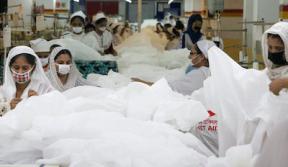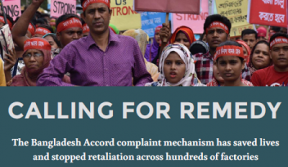This morning fifty protesters, including South Asian activists, labor groups, students, and concerned consumers, held a demonstration in front of Gap, Inc.’s shareholder meeting to urge the company to sign onto the Accord on Fire and Building Safety in Bangladesh.
"We are urging Gap to do its part to help prevent future garment industry disasters like the fire at Tazreen that claimed 112 lives and the building collapse at Rana Plaza that killed over 1,100 people. Gap should live up to their reputation for corporate responsibility," said Claudia Fernandez, a Santa Clara University student who is a member of United Students Against Sweatshops.
"These names that you see here, they are not just names, they are lives. I urge the shareholders of Gap: 'You need to do your job. Don't skirt your responsibilities,'" said Tina Jabeen, another demonstrator, referring to signs displaying names of Bangladeshi workers who were killed in a Gap supplier factory in 2010.
"I feel optimistic that Gap will step up and sign the safety agreement, and I feel so grateful that so many people who aren't directly connected to Bangladesh are here because we need that international solidarity," said Zakia Afrin, a Bangladeshi-American academic and writer who teaches in the School of Law at Golden Gate University.
Forty companies have already signed onto the Accord: Abercrombie & Fitch, Aldi, Benetton, Bonmarche, C&A, Carrefour, Charles Vögele, Comtex, El Corte Inglés, Esprit, Fat Cat, G-Star, H&M, Helly Hansen, HEMA, Hess Natur, Inditex (Zara), JBC, John Lewis, KIK, LIDL, Loblaw, Mango, Marks & Spencer, Mothercare, N. Brown group (SimplyBe, High&Mighty etc.), New Look, Next, Otto Group, Primark, PVH (Tommy Hilfiger, Calvin Klein, etc.), Rewe, Sainsbury's, s.Oliver, Stockmann, Switcher, Tchibo, Tesco, V&D, and WE Group. These signatories include brands and retailers from a dozen countries, with presence in more than 1,000 factories in Bangladesh.
The demonstration at Gap’s shareholder meeting is part of an escalating series of protest activities. Today an Avaaz petition targeting Gap reached over one million signers and thousands of people are flooding Gap’s facebook wall with messages urging the company to sign onto the Bangladesh Safety Accord. Earlier this month, United Students Against Sweatshops and International Labor Rights Forum launched a new website, titled gapdeathtraps.com, with store manager letters, flyers, chants, and petitions, for consumers to take action at Gap stores across the country.
Representing groups owning Gap shares, Anu Mandavilli, and Kirsten Moller both had the opportunity to ask questions inside the shareholder meeting.
“In light of a series of recent calamities in Bangladesh apparel manufacturing plants resulting in an overwhelming loss of life, two groups of investors that control over $2 trillion in assets have called on Gap to join the multi-stakeholder initiative--the Accord on Fire and Building Safety--that involves the International Labour Organization, non-governmental organizations, trade unions and 40 companies, to implement plans with measurable goals to address all aspects of fire and building safety in a timely manner. What does not signing mean for Gap’s reputational risk?” asked Moller, Organizing Director with Global Exchange.
“Gap has publicly stated that it won’t sign the Bangladesh safety accord because it exposes the company and shareholders to too much liability. However, an op-ed in LA Times last Friday written by prominent law professors demonstrates that there is no rational basis to this argument. The law professors state that the accord’s costs are reasonable and quantifiable, and the many major brands and retailers that have signed on — including two large US corporations, PVH and Abercrombie & Fitch— obviously consider these costs reasonable. Does Gap have any legitimate reasons for not signing the accord?” asked Mandavilli, with Friends of South Asia.
In response, Gap CEO Glenn Murphy indicated that Gap is seeking “small changes” in the Accord in order to join. But activists said that if these changes mean making it a non-enforceable, voluntary program that sidelines workers and their unions, that is much more than a “small change.”
“As labor rights advocates in the US, it’s important to also stand with our brothers and sisters abroad. No one anywhere should die for fashion,” said Kung Feng, with San Francisco Jobs with Justice.

